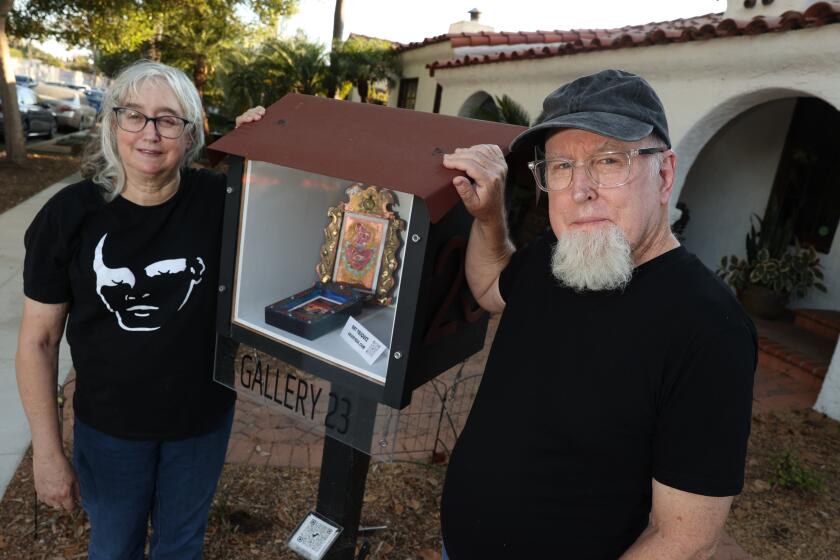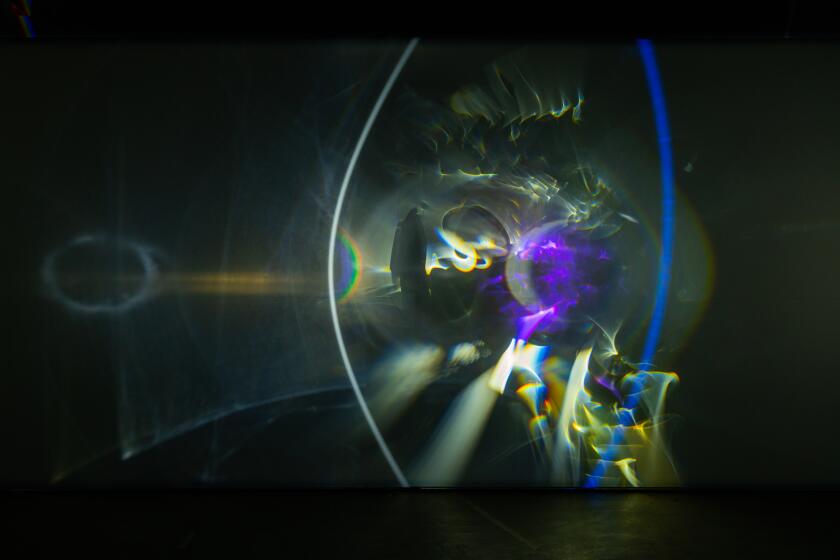‘Don Juan: His Own Version’ by Peter Handke

Don Juan
His Own Version: A Novel
Peter Handke
Farrar, Straus & Giroux: 112 pp., $22
Peter Handke isn’t interested in damnation. He said as much in an interview published in the Drama Review in 1970: “Morality is the least of my concerns. . . . To me, morality in a society that -- however moral its pose -- is hierarchically organized is simply a lie, an alibi for the inequalities that exist in society.” And so “Don Juan: His Own Version” is a story without a moral. It is episodic and uncapped, a text that neither delivers nor allows judgment.
The legend of Don Juan may be one of the most retold stories in literature. More than 1,500 versions of the tale have been written since the 17th century. The earliest known version was published in 1626, called “El burlador de Sevilla y convidado de piedra” by the priest Tirso de Molina. As you might expect from a priest, Tirso’s Don Juan was a villainous scoundrel sent to hell for his sins. Subsequent stories tend to damn Don Juan variously -- and to damn the women who succumbed to or partook in the seduction too. But Handke is defiant of these versions, and his Don Juan isn’t corralled into any tidy deliverance.
The moral ambiguity of this retelling is evident from the very start. Don Juan comes hurtling over a fence into an innkeeper’s garden in the first pages. He is fleeing a pair of pursuers, a couple on a motorbike, who have just caught him peeping at them as they made love in the forest. He is running so fast and hard that his panting can be heard by the lonely innkeeper minutes before his jump over the wall. The innkeeper and new arrival listen to the roar of the motorbike as it approaches and then watch as the couple gives a friendly wave on their way past. Were they in pursuit -- or did they just happen to be going that way?
Handke’s Don Juan is unmistakably that same lover found in the other tales. But somewhere near the middle of the book, Handke delivers a clear summation of his character: “Don Juan was no seducer. He had never seduced a woman. . . . And conversely, Don Juan had never been seduced by a woman. . . . Don Juan’s power emanated from his eyes . . . with his gaze -- and not with his looks, which were rather inconspicuous -- he unleashed the woman’s desire. It was a gaze that took in more than her alone, and different things, a gaze that extended past her and let her be, and thus she knew it was directed at her, and appreciated her; an active gaze. . . . From Don Juan’s eye on her and additionally on the space around her, this woman came to a realization of how alone she had been until then, and recognized that this moment would promptly put an end to that. . . . Becoming aware of loneliness -- the energy, pure and unconditional, of desire.”
This new Don Juan won’t be made a scapegoat for attitudes toward women and their chastity. In the same interview mentioned earlier, Handke also explains that the “only thing that preoccupies me as a writer . . . is nausea at stupid speechification and the resulting brutalization of people. Of course it would disgust me to tell anyone how to live.”
Handke’s novel catches Don Juan in a respite. Having leapt over the wall, he stops his endless wandering for exactly a week, during which time he regales the innkeeper with a chronicle of the preceding week. He describes how he has trysted his way from the Caucasus to Norway via Africa. But, as the novel’s title suggests, Don Juan is not the narrator of this book. The innkeeper, Don Juan’s obedient listener, brings the story to the reader. He is kept narratively chaste by Don Juan, who forbids the asking of questions while he speaks. And the innkeeper is faithful, saying on the last page: “[F]rom what my Don Juan told me about himself I learned the following: those were all false Don Juans -- including Moliere’s, including Mozart’s.”
Indeed, Handke’s Don Juan story may just ruin the reading experience of other versions (which seem dreadfully didactic in comparison). Indeed, one suspects that this was Handke’s intention -- to show them up with his clean, broad narration, which refuses to herd a reader toward conclusion. Handke’s text is anti-reductive. His language is at once specific and ambiguous. Don Juan isn’t treated here to the vagaries of typology; his nature is palpable but unfixed. As the innkeeper says, at the very end: “The rest of the story cannot be told, either by Don Juan or by me, or by anyone else. Don Juan’s story can have no end, and that, on my word, is the definitive and true story of Don Juan.”
Randall is a critic and the translator of “A Hero of Our Time” by Mikhail Lermontov and Yevgeny Zamyatin’s “We.”
More to Read
The biggest entertainment stories
Get our big stories about Hollywood, film, television, music, arts, culture and more right in your inbox as soon as they publish.
You may occasionally receive promotional content from the Los Angeles Times.










